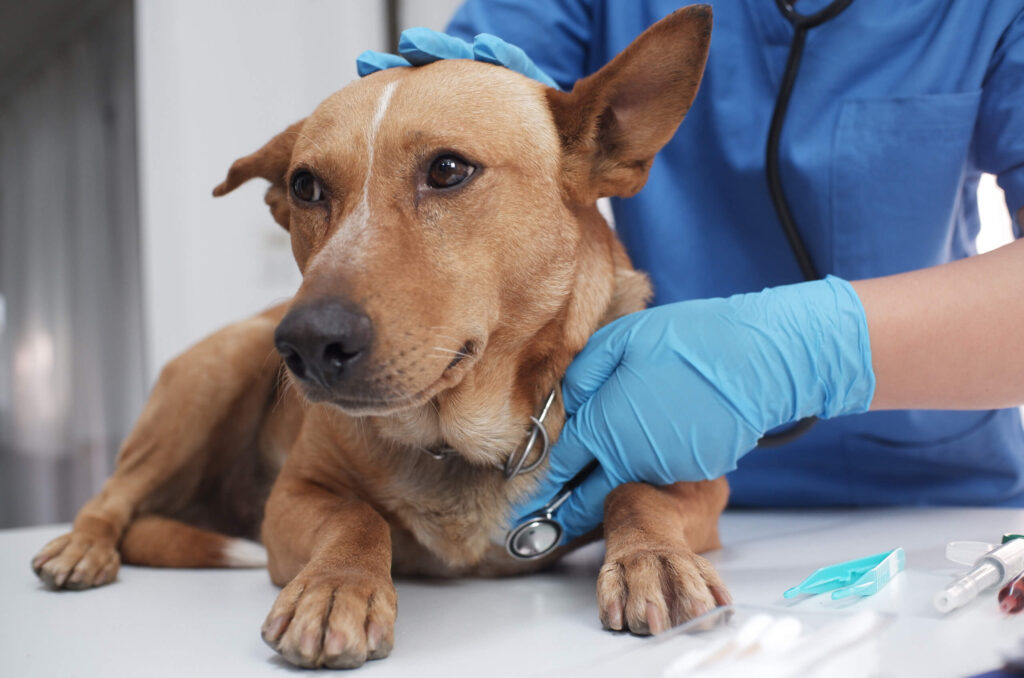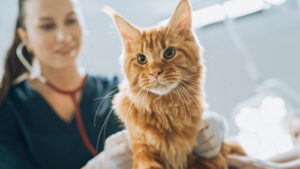When it comes to keeping our pets healthy, regular wellness exams are key. Just like humans, dogs and cats benefit greatly from routine check-ups with their veterinarian. These visits help catch health issues early and keep your pet on track for a long, happy life. If you’re wondering about the right frequency for these important visits or have any questions about your pet’s health, Loveland Regional Animal Hospital in Loveland, OH, is here to help. Give us a call at (513) 697-9796 to schedule an appointment or to get more information about pet wellness exams.
The Importance of Pet Wellness Exams
Pet wellness exams are much more than just routine check-ups. They are an opportunity for veterinarians to assess the overall health of your pet and to detect any potential health issues before they become serious problems. These exams typically include a thorough physical inspection, vaccinations updates, dental assessments, and may also involve blood tests, urine tests, and other diagnostics as needed.
Early Detection and Prevention
Catching a health issue early can make all the difference. Early detection often means easier and less costly treatments, and it can significantly improve your pet’s prognosis.
Tailored Health Advice
Wellness exams are the perfect time to get personalized advice from your vet about your pet’s diet, exercise, and lifestyle to ensure they stay in tip-top shape.
How Often Should Your Pet Visit?
The frequency of wellness exams can vary depending on several factors, including your pet’s age, breed, health status, and lifestyle. Below are more detailed guidelines to help you plan these important visits.
Puppies and Kittens: The Foundation Years
- First Year of Life: Puppies and kittens require several visits during their first year. Initially, these visits might be monthly, from as young as six weeks old up to six months, to complete their vaccinations and monitor their development.
- Focus on Preventive Care: These visits allow the vet to start your pet on a preventive care regimen, including vaccinations, parasite control, and nutritional counseling. It’s also an opportunity to discuss spaying or neutering.
Adult Dogs and Cats: Maintaining Health
- Annual Check-Ups: Once your pet reaches adulthood, the general recommendation is for an annual wellness exam. These yearly pet check-ups are crucial for keeping up with vaccinations, conducting a thorough physical exam, and discussing preventive care.
- Breed-Specific Considerations: Some breeds may have specific health concerns that warrant more frequent monitoring. Your veterinarian can provide guidance tailored to your pet’s breed and individual health needs.
Senior Pets: Enhanced Care for Golden Years
- Bi-Annual Visits: As dogs and cats enter their senior years, usually around the age of 7 (this can vary depending on the size and breed), it’s advisable to increase wellness exams to twice a year. Older pets are more susceptible to diseases such as arthritis, dental disease, diabetes, and kidney disease.
- Comprehensive Evaluations: Senior wellness exams often include more comprehensive evaluations, such as blood tests, urine tests, and other diagnostics to assess organ function and detect diseases early.
Special Considerations
- Chronic Conditions: Pets with chronic health issues may need to see their vet more frequently. Regular monitoring can help manage these conditions and adjust treatments as necessary.
- Lifestyle Changes: Any significant changes in your pet’s lifestyle, such as increased travel or exposure to other animals, might necessitate more frequent check-ups to address any additional health risks.
Working with Your Vet
- Personalized Schedule: The best approach is to work closely with your veterinarian at Loveland Regional Animal Hospital to determine the most appropriate wellness exam schedule for your pet. They can consider your pet’s specific needs to recommend a personalized care plan.
- Stay Proactive: Always keep an eye out for changes in your pet’s behavior, appetite, or activity level between scheduled visits. If you notice anything unusual, don’t wait for the next scheduled exam to bring it to your vet’s attention.
What Happens During a Wellness Exam?
Pet wellness exams are a fundamental part of preventive health care for dogs and cats. These check-ups play a critical role in ensuring your pet lives a long, healthy, and happy life. Here’s a closer look at why pet wellness exams are so important:
Comprehensive Health Assessment
During a wellness exam, your veterinarian conducts a thorough physical examination of your pet. This includes assessing the condition of your pet’s coat and skin, checking their eyes, ears, and mouth for any abnormalities, and listening to their heart and lungs. This comprehensive assessment helps identify any early signs of health issues that may not be visible to the untrained eye.
Early Detection of Diseases
One of the most valuable aspects of pet wellness exams is the early detection of diseases. Conditions like diabetes, heart disease, and kidney issues can be much more manageable when caught early. Early detection often leads to more effective treatment, which can extend your pet’s life and improve their quality of life.
Vaccination Updates
Keeping your pet’s vaccinations up to date is crucial in protecting them from various infectious diseases. During a wellness exam, your vet will review your pet’s vaccination history and recommend any necessary updates. This not only protects your pet but also helps in preventing the spread of diseases to other animals.
Parasite Prevention
Wellness exams are an opportunity to discuss and update parasite prevention strategies. Your vet can recommend the best products to protect your pet from fleas, ticks, heartworms, and other parasites. Effective parasite prevention is essential for avoiding diseases that can affect your pet’s health and sometimes even the health of your family.
Nutritional Counseling
Your vet can provide personalized advice on your pet’s nutritional needs during a wellness exam. Proper nutrition is essential for maintaining your pet’s health, managing weight, and preventing obesity-related health issues. Your vet can recommend specific diets based on your pet’s age, breed, and health status.
Dental Health
Dental health is a critical component of your pet’s overall health. During a wellness exam, your vet will check your pet’s teeth and gums for any signs of dental disease, which is common in dogs and cats. Dental problems can lead to other health issues, so pet teeth cleanings are vital for early detection and treatment.
Behavioral Advice
Wellness exams are a great time to discuss any behavioral concerns with your veterinarian. Changes in behavior can sometimes indicate underlying health problems. Your vet can offer advice on training, socialization, and addressing any behavioral issues.
Tailored Health Care Plan
Based on the findings of the wellness exam, your veterinarian can create a tailored health care plan for your pet. This plan might include recommendations for diet, exercise, dental care, and any needed medications or treatments. A personalized approach to your pet’s health care can help address specific health concerns and promote a healthy lifestyle.
Pet wellness exams are an investment in your pet’s health and well-being. Regular check-ups help build a strong foundation for a long and healthy life. If you have any questions about scheduling a wellness exam or want to learn more about the services offered at Loveland Regional Animal Hospital, please give us a call at (513) 697-9796. Our team is dedicated to supporting your pet’s health every step of the way.
Preparing for Your Pet’s Wellness Exam
Making preparations before your visit can lead to a more efficient and effective appointment. Here’s what you can do:
Keep a Health and Behavior Journal
- Record Observations: Keep notes on any changes in your pet’s behavior, diet, or activity levels. Even small changes can be important indicators of health issues.
- Track Symptoms: If you notice any symptoms like coughing, sneezing, vomiting, or changes in bowel movements, write down when they started and how often they occur.
Compile a List of Questions and Concerns
- Prepare Your Questions: Write down any questions or concerns you have about your pet’s health, behavior, diet, or lifestyle. No question is too small, and it’s easy to forget what you wanted to ask during the visit.
- Behavioral Issues: Include any questions related to your pet’s behavior, such as changes in sleeping patterns, interactions with other pets, or new fears/anxieties.
Gather Your Pet’s Medical Records
- New Patients: If this is your first visit to a new vet, bring your pet’s medical records, including vaccination history and any previous health issues or surgeries.
- Medication and Supplements: Make a list of any medications, supplements, or over-the-counter treatments your pet is currently taking, including the dosage and frequency.
Plan for the Physical Examination
- Fasting: Check with your vet if they require your pet to fast before the exam, especially if blood work is expected to be part of the visit.
- Comfort Items: Bring a favorite toy or blanket to help your pet feel more comfortable and secure during their visit.
Update on Lifestyle Changes
- New Developments: Inform your vet about any significant changes in your pet’s environment or routine, such as a move to a new home, new pets in the household, or changes in exercise routines.
Reflect on Your Pet’s Diet
- Dietary Details: Be ready to discuss your pet’s diet, including the brand and type of food, how much and how often you feed them, and if you’ve noticed any changes in their appetite or drinking habits.
Social and Behavioral Information
- Socialization: Share any concerns about your pet’s social behavior, including how they interact with other animals and people, especially if there have been any changes.
What to Bring
- Essentials: Bring your pet in a carrier or on a leash, depending on the type of pet. Also, consider bringing any recent stool samples if your vet has requested it for testing.
Schedule Your Wellness Exam at Loveland Regional Animal Hospital
Regular wellness exams are a cornerstone of good pet health. By keeping up with your pet’s check-ups, you’re giving them the best chance at a long, healthy life. If it’s time for your pet’s next wellness exam, or if you have any questions about pet-wellness-exams, don’t hesitate to reach out to Loveland Regional Animal Hospital. Our team is committed to providing the highest level of care for your pets. Call us today at (513) 697-9796 to schedule your pet’s next visit. Let’s work together to keep your beloved dogs and cats healthy and happy for years to come.





